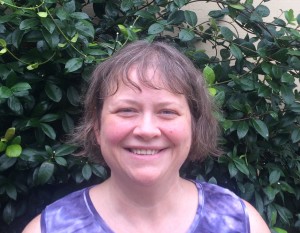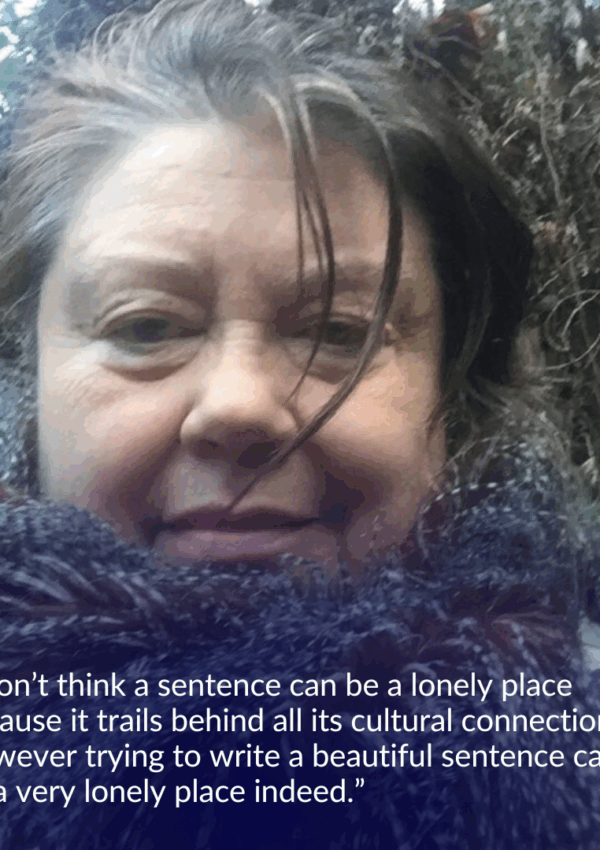Laryngitis is, of course, a temporary loss of voice. You try to speak, and what comes out is this awkward, hollow hiss, like a particularly disgruntled ghost dragging a rusty pitchfork across a chalkboard, and then everyone around you puts their hands to their ears and urges you to rest. But you can’t let it rest—because if you don’t test it, how will you know when it returns?
As a writer, I’ve had a different kind of laryngitis. As a girl, I wrote constantly: songs about my dogs, poems my mother typed up on rainbow-hued origami paper, short stories scrawled on wide rule notebook paper in big loopy handwriting, tragic rhyming poems oozing with teen angst, a hundred pages of a novel. And then I lost my voice, stopped writing almost completely, for seventeen years.
The virus that triggered this little bout of writer’s laryngitis was my ex-husband (I think I like this analogy!). He wanted to see everything I wrote, partly because he was interested, partly because with him everything had to be shared, and partly because he wondered if it was about him. I didn’t want to share. Poetry was my secret garden, a safe place where I could explore things beautiful and dangerous, look in scary caves or keep my head in the clouds. I remember a moment, sitting on the edge of our bed after an argument about my secretive writing. I stared down at the beige carpet and arrived at the decision that the only way forward was to consciously stop writing, to lock up the keys to my garden gate and never enter it again.
Of course, every so often, I couldn’t help myself. As I said, if you don’t test your voice, you wonder whether it is still there. Somewhere along the way, it occurred to me to move my garden gate to the office, and I kept a green spiral notebook in my desk drawer. I began to test my voice more often, and it grew stronger.
When my marriage ended, I was looking for something to do one weekend and saw an ad for the Austin Poetry Society’s monthly critique group. This was a revolutionary idea for me—that poetry didn’t have to be done in secret, hidden away, whispered behind closed doors with the lights off. These people were doing it in public (albeit at a library), out loud, with the lights on, and, occasionally, with the door open, and they even put an ad in the paper (and not on the back page with the sensual masseuses either)—as though using your poetic voice were somehow actually socially acceptable. Obviously, I had to go, if only to see who these strange people were who self-identified as poets—but I didn’t tell friends or family that I was going, either. And there was that nagging worry—if I hadn’t used my poetic voice in so long, was it still there? When I opened my mouth to read, would they put their hands to their ears and tell me to give my voice another decade’s rest?
Fortunately, no one told me to shut up. They listened (twice!) and made thoughtful, supportive comments. The group leader encouraged me to submit the poem to the Texas Poetry Calendar (Poetry on calendars? Who does this?). One very nice lady took me to lunch, and I promise you it was the one lunch I had that week that didn’t involve Ramen noodles. In short—they took me seriously. It took me another five years to stop questioning their sanity for doing so.
I was obsessed with my newly rediscovered voice—was it really any good? What was ‘good’ anyway, and who decides that? Back in my first career as a high school English teacher, I had tried to engage students with poetry by having them explore that very question. I would divide them into groups and give each group four poems with no identified author on the same general theme (love and loss, to be extra relatable). One was from A.E. Housman, one from Edna St. Vincent Millay, one was an extremely trite student poem from a college student magazine, and one I had written myself. The analytical part of the task was for them to sort out which author was which based on context clues (diction, imagery, etc.). The more interesting part was to rank the poems from ‘best’ to ‘worst’…and justify. My goal was to get them to engage with and relate to the poetry, to, in E.E. Cummings’ words, find the more beautiful answer who asks a more beautiful question. But also, I admit, I wanted to know the answer to my question myself.
Was it that the better poems got published and the amateur poems did not? Most student groups related better to the trite student poem than the highly structured, more subtle Housman poem. My own poem was pretty solidly disliked by ninth graders, although, many years later, it won a contest and got published after all. What I was hoping for was that my students would look for complexity, novelty, depth—in other words, I wanted them to look for the same things I looked for. I wanted them to ratify my role as the decider of what is ‘good’.
When I started writing again, the analytical part of my brain looked for objective measures, clear signs as to whether I should keep testing this strange new voice or lock it back away. I tried resurrecting the same criteria I had used as a teacher: complexity, novelty, depth, and, above all, publication. Against those criteria, it was clear that my voice was not good—I hadn’t been published. I accepted myself as less than those who sat around the library table at critique group with me. And that easy acceptance saved me from the terrible responsibility of occasionally taking myself even a little seriously. A friend, probably exasperated with my constant search for a definition of ‘good’, said, “I wish you would write for you.”
But that was the whole problem, wasn’t it? For too long, I was the only person I wrote for, when I allowed myself to do so. We humans get a little bit strange in solitary confinement; it isn’t natural. Words echo and get distorted in the absence of other voices, and perspectives skew.
This, to me, is the singular beauty of the literary community—that it is a community. It took several years for me to trust my voice, that it still works and that I have the skill to use it without making listeners cringe, and I never could have gotten there without listeners and places to try out my voice, to see what lines resonate and which tumble out awkwardly. A community is a place of conversation and dialogue. A good community is one where you can leave the gate to your secret garden unlocked and open and the neighbors can wander over for barbecue and not throw beer cans in the hidden spring or step on the orchids. In a really good community, you’ll find those special neighbors who bring over a few seed packets or a particularly spectacular gnome (you know, the gnome with the pink frilly bikini).
The other really lovely thing about a community is the diversity of its members. It was through that diversity that I finally found the more beautiful answer to my question about what is ‘good.’ Everyone I’ve met in our poetry community has a unique voice, expressed in a unique style. One writes witty rhyming poems. One writes stream-of-consciousness poems in a single, dizzying sentence full of allusions. This poet writes gritty, personal poems; that one writes thoughtful, detached poems. We poets are less a Gregorian chant than a postmodern symphony.
With all those differing voices, it becomes harder and harder to define what is good. The more beautiful question is: what resonates? What word or phrase or poem touches me, and why? The answers to that question are limitless and thought provoking. They contribute to the conversation. I wander in your garden and realize we share the same weed. I stand by your koi pond and you describe the fish in a way that makes me question everything I think I know about fish. You turn over a rock and I weep at the rotting lizard underneath. And in doing so, we connect and talk, opening the doors to our secret gardens wider with each poem, sharing our humanity.
In order to resonate, I have to share my voice. Having once silenced my voice, I know how easy it is to withdraw. So I attend meetings and readings, send my work out to magazines such as this one, enter contests—in short, participate in the community of voices. My garden stands open—care to come in?
 Diana L. Conces lives and writes near Austin, TX. Her work has been published in numerous anthologies, including Black Fox Literary Magazine (Vol. 14); Best of Austin Poetry (2 volumes); Tic Toc, Petals in the Pan, Secrets and Dreams, and Shattered from Kind of a Hurricane Press; Texas Poetry Calendar (2016 and 2017 editions); Bearing the Mask: Southwestern Persona Poems; Blue Hole; and artlines2: Art Becomes Poetry. She has won numerous local contests and has had one of her poems appear on a Capitol Metro bus.
Diana L. Conces lives and writes near Austin, TX. Her work has been published in numerous anthologies, including Black Fox Literary Magazine (Vol. 14); Best of Austin Poetry (2 volumes); Tic Toc, Petals in the Pan, Secrets and Dreams, and Shattered from Kind of a Hurricane Press; Texas Poetry Calendar (2016 and 2017 editions); Bearing the Mask: Southwestern Persona Poems; Blue Hole; and artlines2: Art Becomes Poetry. She has won numerous local contests and has had one of her poems appear on a Capitol Metro bus.
Diana’s poetry is in Black Fox‘s current Issue #14.




A wonderful post, Diana L. Conces! I love the conceit of writing as one’s secret garden. So glad you have opened the garden gate to your friends and delighted readers in Austin!
Thanks Diane for sharing your thoughts in your blog. I always like your poems, thoughtful, natural and interesting. Would love to read more of your work.
Shubh Schiesser